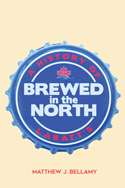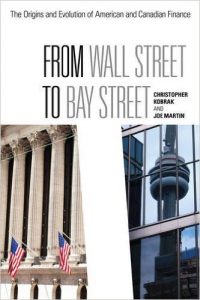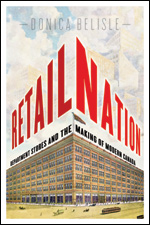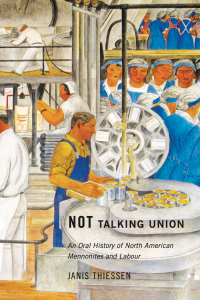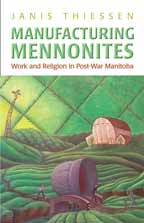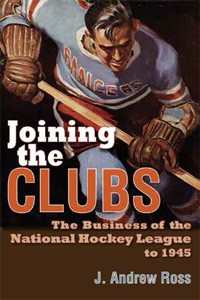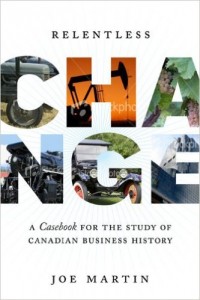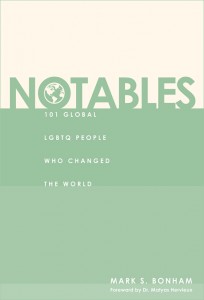The following publications by CBHA/ACHA members are available:
Daniel J. Robinson,Cigarette Nation: Business, Health, and Canadian Smokers, 1930-1975, Montreal and Kingston, McGill-Queen’s University Press, 2021. Hardcover/Paperback $37.95
In the 1950s, the causal link between smoking and lung cancer surfaced in medical journals and mainstream media. Yet the best years for the Canadian cigarette industry were still to come, as per capita cigarette consumption rose steadily in the 1960s and 1970s. In Cigarette Nation, Daniel Robinson examines the vibrant and contentious history of smoking to discover why Canadians continued to light up despite the publicized health risks.
Highlighting the prolific marketing and advertising practices that helped make smoking a staple of everyday life, Robinson explores socio-cultural aspects of cigarette use from the 1930s to the 1950s and recounts the views and actions of tobacco executives, government officials, and Canadian smokers as they responded to mounting evidence that cigarette use was harmful. The persistence of smoking owes to such factors as product development, marketing and retailing innovation, public relations, sponsored science, and government inaction. Domestic and international tobacco firms worked to furnish Canadian smokers with hope and doubt: hope in the form of reassuring marketing, as seen with light and mild cigarette brands, and doubt by means of disinformation campaigns attacking medical research and press accounts that aligned cigarettes with serious disease.
Drawing on a wide range of primary sources, including thousands of industry records released during a landmark tobacco class-action trial in 2015, Cigarette Nation documents in rich detail the history of one of Canada’s foremost public health issues.
Andrea Benoit,Viva M·A·C: Aids, Fashion, and the Philanthropic Practices of M·A·C Cosmetics, Toronto: University of Toronto Press, 2019.
The first cultural history of the iconic brand M·A·C Cosmetics, VIVA M·A·C charts the evolution of M·A·C’s revolutionary corporate philanthropy around HIV/AIDS awareness. Drawing upon exclusive interviews with M·A·C co-founder Frank Toskan, key journalists, and fashion insiders, Andrea Benoit tells the fascinating story of how M·A·C's unique style of corporate social responsibility emerged from specific cultural practices, rather than being part of a strategic marketing plan.
Benoit delves into the history of the M·A·C AIDS Fund and its signature VIVA GLAM fundraising lipstick, which featured drag performer RuPaul and singer k.d. lang in its first advertising campaigns. This lively chronicle reveals how M·A·C managed to not only defy the stigma associated with AIDS that alarmed many other corporations, but to engage in highly successful AIDS advocacy while maintaining its creative and fashionable authority.
Donica Belisle, Purchasing Power: Women and the Rise of a Canadian Consumer Culture. Toronto: University of Toronto Press, 2020.
Exploring the roots of Canadian consumer culture between the 1890s and the Second World War, Purchasing Power uncovers the meanings that Canadians have attached to consumer goods. Offering a new perspective on the temperance, conservation, home economics, feminist, and co-operative movements of this period, this book brings women’s consumer interests to the fore. Due to their exclusion from formal politics and most paid employment, many Canadian women leveraged their consumer roles into personal and social opportunities. In the consumer sphere, they sought solutions for their isolation, their desire for upward mobility and personal expression, and their families’ survival. Through their purchasing power, Canadian women transformed consumer culture into an arena of political engagement.
Matthew J. Bellamy, Brewed in the North: A History of Labatt’s. Montréal, PQ, Kingston, ON: McGill-Queen’s University Press, 2019.
For decades, the name Labatt was synonymous with beer in Canada, but no longer. Brewed in the North traces the birth, growth, and demise of one of the nation's oldest and most successful breweries.
Opening a window into Canada's complicated relationship with beer, Matthew Bellamy examines the strategic decisions taken by a long line of Labatt family members and professional managers from the 1840s, when John Kinder Labatt entered the business of brewing in the Upper Canadian town of London, to the globalization of the industry in the 1990s. Spotlighting the challenges involved as Labatt executives adjusted to external shocks - the advent of the railway, Prohibition, war, the Great Depression, new forms of competition, and free trade - Bellamy offers a case study of success and failure in business. Through Labatt's lively history from 1847 to 1995, this book explores the wider spirit of Canadian capitalism, the interplay between the state's moral economy and enterprise, and the difficulties of creating popular beer brands in a country that is regionally, linguistically, and culturally diverse.
A comprehensive look at one of the industry's most iconic firms, Brewed in the North sheds light on what it takes to succeed in the business of Canadian brewing.
Graham D. Taylor, Imperial Standard: Imperial Oil, Exxon, and the Canadian Oil Industry from 1880. Calgary, AB: University of Calgary Press, 2019.
Petrolium History Society Book of the Year. The authoritative, full-scale history of Imperial Oil and their longstanding business relationship with Standard Oil of New Jersey, also known as Exxon-Mobil.
For over 130 years, Imperial Oil dominated Canada’s oil industry. From Petrolia to Turner Valley, Imperial was always nearby and ready to take charge. Their 1947 discovery of crude oil in Leduc, Alberta transformed the industry and the country. But from 1899 onwards, two-thirds of the company was owned by an American giant, making Imperial Oil one of the largest foreign-controlled multinationals in Canada.
Imperial Standard is the first full-scale history of Imperial Oil. It illuminates Imperial’s longstanding connections to Standard Oil of New Jersey, also known as Exxon Mobil. Although this relationship was often beneficial to Imperial, allowing them access to technology and capital, it also came at a cost. During the energy crises of the 1970s and 80s, Imperial was assailed as the embodiment of foreign control of Canada’s natural resources, and in the 1990s it followed Exxon’s lead in resisting charges that the oil industry contributes to climate change.
Graham D. Taylor draws on an extensive collection of primary sources, including both the Imperial Oil and Exxon Mobil archives, to explore the complex relationship between the two companies. This groundbreaking history provides unprecedented insight into one of Canada’s most influential oil companies as well as the industry itself.
Tijerina, Stefano, Opportunism and Goodwill: Canadian Business Expansion in Colombia, 1867–1979, University of Toronto Press. Cloth: $48.75; e-book: $48.75.
 Canada’s social, economic, political, and environmental impacts on the Western Hemisphere have been largely overlooked by historians and other social scientists. Most narratives of the relationships between North America and the emerging markets of the south disproportionately focus on the United States. By downplaying Canada’s role, these narratives have fallen short in reconstructing the history of the region. Opportunism and Goodwill fills in these historical gaps, looking at the dynamics of the relationship between Canada and Colombia as they were spearheaded by Canada’s private sector.
Canada’s social, economic, political, and environmental impacts on the Western Hemisphere have been largely overlooked by historians and other social scientists. Most narratives of the relationships between North America and the emerging markets of the south disproportionately focus on the United States. By downplaying Canada’s role, these narratives have fallen short in reconstructing the history of the region. Opportunism and Goodwill fills in these historical gaps, looking at the dynamics of the relationship between Canada and Colombia as they were spearheaded by Canada’s private sector.
Stefano Tijerina argues that since the first era of globalization during the second half of the nineteenth century, Canada’s private sector has carved out niche markets across Latin America, sometimes working independently and in other instances working on behalf of foreign interests. In his historical analysis of these temporal and spatial dimensions, Tijerina shows that the long-term economic development of Canada and Colombia was intertwined and interdependent, ultimately stressing the importance of transnational approaches to the study of history. Contributing to questions about Canada’s "goodwill" and other benevolent constructs, Opportunism and Goodwill sets the historical foundation for current debates about Canadian industries across the world.
 Torrie, Virginia, Reinventing Bankruptcy Law: A History of the Companies’ Creditors Arrangement Act, University of Toronto Press. Cloth: $56.25; e-book: $56.25. This book explodes conventional wisdom about the history of the Companies’ Creditors Arrangement Act and in its place offers the first historical account of Canada’s premier corporate restructuring statute. The book adopts a novel research approach that combines legal history, socio-legal theory, ideas from political science, and doctrinal legal analysis. Meticulously researched and multi-disciplinary, Reinventing Bankruptcy Law provides a comprehensive and concise history of CCAA law over the course of the twentieth century, framing developments within broader changes in Canadian institutions including federalism, judicial review, and statutory interpretation. Examining the influence of private parties and commercial practices on lawmaking, Virginia Torrie argues that CCAA law was shaped by the commercial needs of powerful creditors to restructure corporate borrowers, providing a compelling thesis about the dynamics of legal change in the context of corporate restructuring. Torrie exposes the errors in recent case law to devastating effect and argues that courts and the legislature have switched roles – leading to the conclusion that contemporary CCAA courts function like a modern day Court of Chancery. This book is essential reading for the Canadian insolvency community as well as those interested in Canadian institutions, legal history, and the dynamics of change.
Torrie, Virginia, Reinventing Bankruptcy Law: A History of the Companies’ Creditors Arrangement Act, University of Toronto Press. Cloth: $56.25; e-book: $56.25. This book explodes conventional wisdom about the history of the Companies’ Creditors Arrangement Act and in its place offers the first historical account of Canada’s premier corporate restructuring statute. The book adopts a novel research approach that combines legal history, socio-legal theory, ideas from political science, and doctrinal legal analysis. Meticulously researched and multi-disciplinary, Reinventing Bankruptcy Law provides a comprehensive and concise history of CCAA law over the course of the twentieth century, framing developments within broader changes in Canadian institutions including federalism, judicial review, and statutory interpretation. Examining the influence of private parties and commercial practices on lawmaking, Virginia Torrie argues that CCAA law was shaped by the commercial needs of powerful creditors to restructure corporate borrowers, providing a compelling thesis about the dynamics of legal change in the context of corporate restructuring. Torrie exposes the errors in recent case law to devastating effect and argues that courts and the legislature have switched roles – leading to the conclusion that contemporary CCAA courts function like a modern day Court of Chancery. This book is essential reading for the Canadian insolvency community as well as those interested in Canadian institutions, legal history, and the dynamics of change.
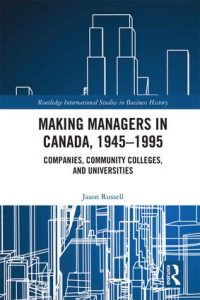 Russell, Jason, Making Managers in Canada, 1945-1995: Companies, Community Colleges, and Universities, Routledge. Hardcover: US$ 140; e-book: US$ 24.95. Management education and training was a key influence on Canadian capital and labour in the post-World War II decades, however it has been the subject of comparatively little academic inquiry. In many ways, historians have frequently learned about management behavior in unionized workplaces by examining labor-management relations. The management experience has thus often been seen through the eyes of rank-and-file workers rather than from the perspective of managers themselves. This book discusses how managers were trained and educated in Canada in the years following the Second World War.
Russell, Jason, Making Managers in Canada, 1945-1995: Companies, Community Colleges, and Universities, Routledge. Hardcover: US$ 140; e-book: US$ 24.95. Management education and training was a key influence on Canadian capital and labour in the post-World War II decades, however it has been the subject of comparatively little academic inquiry. In many ways, historians have frequently learned about management behavior in unionized workplaces by examining labor-management relations. The management experience has thus often been seen through the eyes of rank-and-file workers rather than from the perspective of managers themselves. This book discusses how managers were trained and educated in Canada in the years following the Second World War.
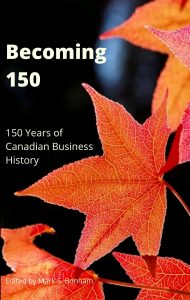 Becoming 150: 150 Years of Canadian Business History presents selected papers from the CBHA/ACHA Annual Conference 2017. The book presents informative insight into the development of Canada's economy and business sectors since Confederation in 1867. This book is a must read for business people, students and entrepreneurs, and is composed of 18 essays written by business people, academics and recent graduate students outlining the history of Canadian businesses in 8 different topics. Subjects covered include the financial sector, women in Canadian business history, industrial and manufacturing, rural business history, and more. Paperback. 260 pages, including Index.
Becoming 150: 150 Years of Canadian Business History presents selected papers from the CBHA/ACHA Annual Conference 2017. The book presents informative insight into the development of Canada's economy and business sectors since Confederation in 1867. This book is a must read for business people, students and entrepreneurs, and is composed of 18 essays written by business people, academics and recent graduate students outlining the history of Canadian businesses in 8 different topics. Subjects covered include the financial sector, women in Canadian business history, industrial and manufacturing, rural business history, and more. Paperback. 260 pages, including Index.
Free Shipping on All Orders.
Russell, Jason, Our Union: UAW/CAW Local 27 From 1950 to 1990, Athabasca University Press. Paperback US$ 29.95
The post-war period witnessed dramatic changes in the lives of working-class families. Wages rose, working hours were reduced, pension plans and state social security measures offered greater protection against unemployment, illness, and old age, the standard of living improved, and women and members of immigrant communities entered the labour market in growing numbers. Existing studies of the post-war period have focused above all on unions at the national and international levels, on the "post-war settlement," including the impact of Fordism, and on the chiefly economic issues surrounding collective bargaining, while relatively scant attention has been paid to the role of the union local in daily working-class experience.
In Our Union, Jason Russell argues that the union local, as an institution of working-class organization, was a key agent for the Canadian working class as it sought to create a new place for itself in the decades following World War II. Using UAW/CAW Local 27, a broad-based union in London, Ontario, as a case study, he offers a ground-level look at union membership, including some of the social and political agendas that informed union activities. As he writes in the introduction, "This book is as much an outgrowth of years of rank-and-file union activism as it is the result of academic curiosity." Drawing on interviews with former members of UAW/CAW Local 27 as well as on archival sources, Russell offers a narrative that will speak not only to labour historians but to the people about whom they write.
Martin, Joe and Chris Kobrak, From Wall Street to Bay Street: The Origins and Evolution of American and Canadian Finance, University of Toronto Press. 192 pages. Hardcover C$60.00, Paperback C$ 21.98
The 2008 financial crisis rippled across the globe and triggered a worldwide recession. Unlike the American banking system which experienced massive losses, takeovers, and taxpayer funded bailouts, Canada’s banking system withstood the crisis relatively well and maintained its liquidity and profitability. The divergence in the two banking systems can be traced to their distinct institutional and political histories.
From Wall Street to Bay Street is the first book for a lay audience to tackle the similarities and differences between the financial systems of Canada and the United States. Christopher Kobrak and Joe Martin reveal the different paths each system has taken since the early nineteenth-century, despite the fact that they both originate from the British system. The authors trace the roots of each country’s financial systems back to Alexander Hamilton and insightfully argue that while Canada has preserved a Hamiltonian financial tradition, the United States has favoured the populist Jacksonian tradition since the 1830s. The sporadic and inconsistent fashion in which the American system have changed over time is at odds with the evolutionary path taken by the Canadian system. From Wall Street to Bay Street offers a timely and accessible comparison of financial systems that reflects the political and cultural milieus of two of the world’s top ten economies.
Paul Litt, Trudeaumania, UBC Press. 424 pages. Hardcover C$39.42
In 1968, Canadians dared to take a chance on a new kind of politician. Pierre Trudeau became the leader of the Liberal Party in April and two months later won the federal election. His meteoric rise to power was driven by Trudeaumania, an explosive mix of passion and fear fueled by media hype and nationalist ambition. This book traces what happened when the fabled spirit of the sixties met the excitement of the Centennial and Expo 67. Canadians wanted to modernize their nation, differentiate it from the US, and defuse Quebec separatism. Far from being a sixties crazy moment, Trudeaumania was a passionate quest for a new Canada that would define the values of Canadians for decades to come.
Donic Belisle, Retail Nation: Department Stores and the Making of Modern Canada, UBC Press, 2011. 320 pages. Hardcover: C$87.00, Paperback: C$34.95
Retail Nation traces Canada's transformation into a modern consumer nation back to an era when Eaton’s, Simpson's, and the Hudson’s Bay Company fostered and came to rule the country’s shopping scene. Between 1890 and 1940, department stores revolutionized selling and shopping by parlaying cheap raw materials, business-friendly government policies, and growing demand for low-priced goods into retail empires that promised to meet citizens' needs and strengthen the nation.
This vivid account of Canadian department stores in their heyday showcases them as powerful agents of nationalism and modernization. But the nation that their catalogues and shopping experience helped to define -- white, consumerist, middle-class -- was more limited than nostalgic portraits of the early department store suggest.
Winner, 2012 Pierre Savard Award, the International Council of Canadian Studies.
Shortlisted, 2012 John W. Dafoe Book Prize, J. W. Dafoe Foundation
Honourable Mention, 2012 Sir John A. Macdonald Prize, Canadian Historical Association
Janis Thiessen, Not Talking Union: An Oral History of North American Mennonites and Labour, McGill-Queen's University Press, 2016. 272 pages. Paperback: C$30.36
Drawing on over a hundred interviews, Janis Thiessen explores Mennonite responses to labour movements such as Cesar Chavez and the United Farm Workers, as well as Mennonite involvement in conscientious objection to unions. This innovative study of the Mennonites - a people at once united by an ethnic and religious identity, yet also shaped by differences in geography, immigration histories, denomination, and class position - provides insights into how and why they have resisted involvement in organized labour. Not Talking Union adds a unique perspective to the history of labour, exploring how people negotiate tensions between their commitments to faith and conscience and the demands of their employment.
Janis Thiessen, Manufacturing Mennonites: Work and Religion in Post-War Manitoba, University of Toronto Press, 2013. 264 pages. Softcover: C$23.76. Cloth: C$48.75
Examines the efforts of Mennonite intellectuals and business leaders to redefine the group's ethno-religious identity in response to changing economic and social conditions after 1945. As the industrial workplace was one of the most significant venues in which competing identity claims were contested during this period, Janis Thiessen explores how Mennonite workers responded to such redefinitions and how they affected class relations.
J. Andrew Ross, Joining the Clubs: The Business of the National Hockey League to 1945, Syracuse University Press, 2015. Cloth. 440 pages. US$49.95
"The most comprehensive history to date of the NHL’s rise from just another league to the center of control over the development of hockey in Canada and much of the USA. The book is very important because of its depth and breadth."—Stephen Hardy, University of New Hampshire.
Joe Martin, Relentless Change: A Case Book for the Study of Canadian Business History, University of Toronto Press, 2009. 504 pages. Softcover: C$41.43. Hardcover: C$85.00
Casebooks in business history are designed to instruct students in classrooms and boardrooms about the evolution of business management. The first casebook for the study of business history in a Canadian context, Joseph E. Martin's text will help students, both in the classroom and the boardroom, understand the Canadian economy and guide them in making sound decisions and contributing to a healthy, growing economy.
Thirteen original case studies from the mid-nineteenth to the twenty-first centuries deal with different industry sectors as well as individual corporations and managers. Overviews provide context by examining major public policy decisions and key developments in the financial system that have affected business practices. Martin also presents eight original tables that trace the evolution of the 60 largest Canadian corporations between 1905 and 2005. Relentless Change is an invaluable resource for instructors and business students and clearly demonstrates how businesses are affected by the interaction of individual decisions, policy changes, and market trends.
Mark S. Bonham, Notables: 101 Global LGBTQ People Who Changed the World, University of Toronto Press, 2015. Softcover. 212 pages. C$19.95
Reveals a group of select Lesbian, Gay, Bisexual, Transgender, and Queer (LGBTQ) individuals whose personal accomplishments in their profession changed the world in some relevant way.
Included are founders of various social movements, innovators in sports, leaders in business and politics, explorers and discoverers, instigators in religious movements, thinkers in philosophy, infamous villains, creators of new academic fields of study, and risk takers in the arts, culture, and entertainment worlds.




